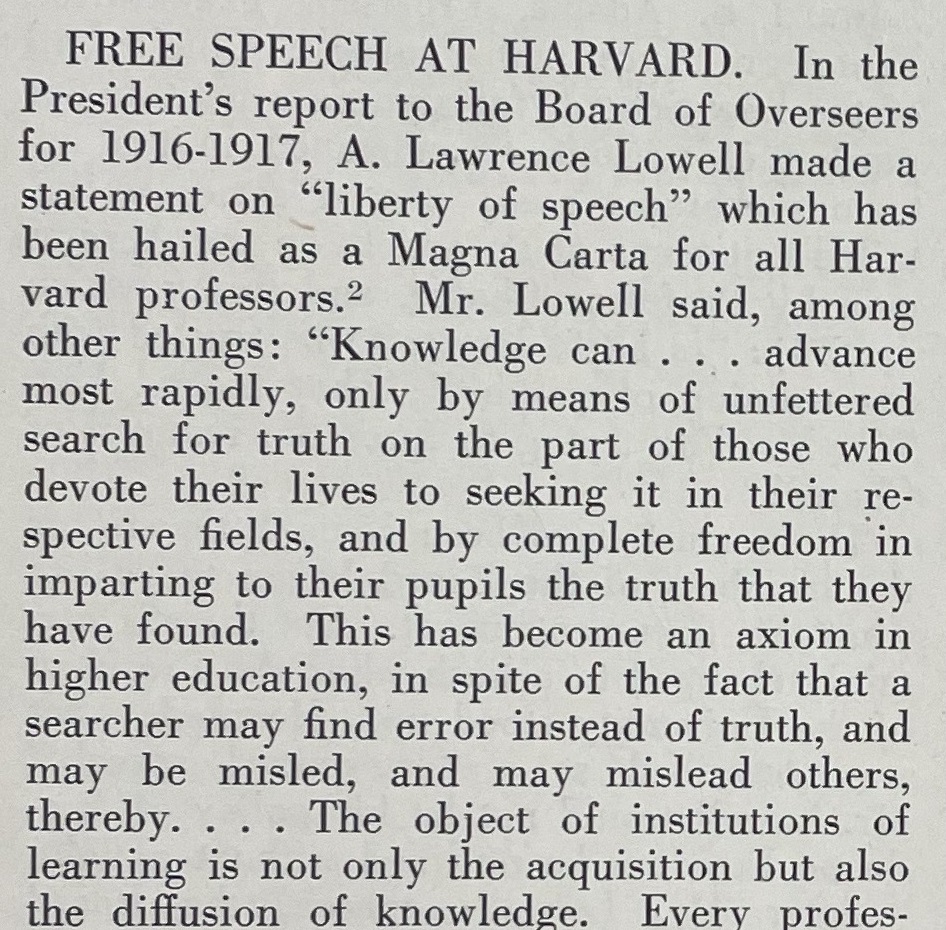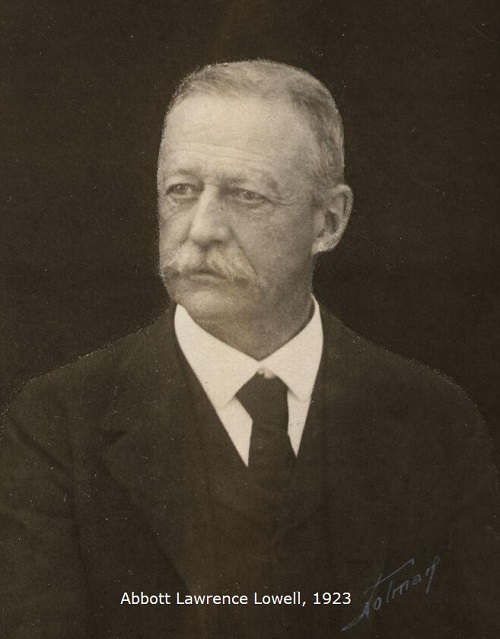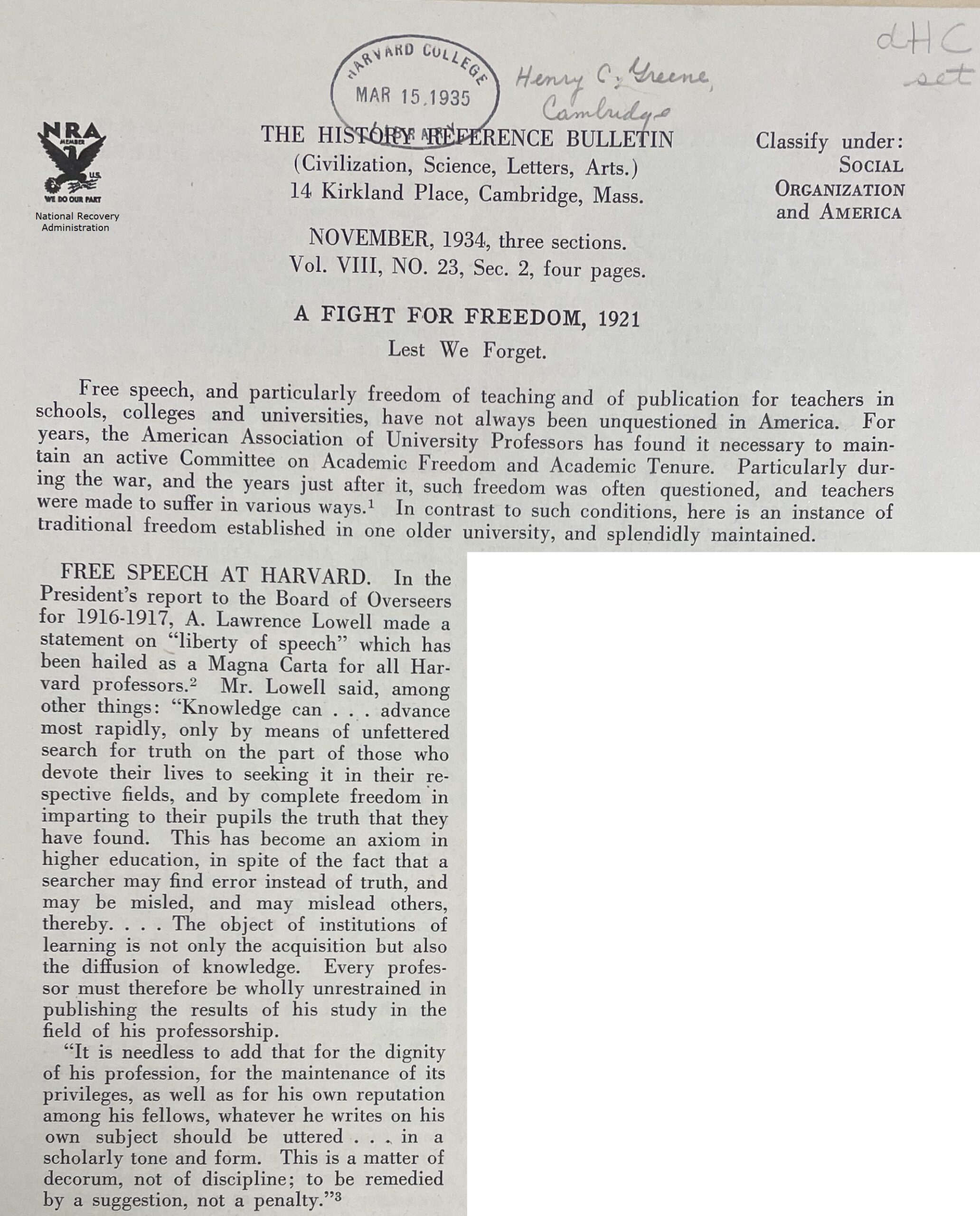Lesson from the Past
LOWELL WOULD NOT RESTRAIN FACULTY
President of Harvard Says Professors Are Entitled to Express Their Personal Views.
SEES NO MIDDLE GROUND
Draws Distinction Between Academlc Freedom and Common
Rights of a Citizen.
President A. Lawrence Lowell of Harvard University in his annual report, which has just been published, discusses liberty of speech on the part of university professors, a subject which he points out has been brought to the front as a result of the war. While professors are sometimes guilty of indiscretions President Lowell says that in his opinion the placing of a restraint upon a professor as to what he may or may not say as a citizen will do more harm than will be the case If he is left free to give expression to his opinions.

Read more below
“The war,” says Dr. Lowell, ” has brought to the front in academic life many questions which are new, or present themselves to many persons in a new light. One of these Is liberty of speech on the part of the professor; and it seems a not upfitting time to analyze the principles involved, and seek to discover their limitations. In so doing I shall deal only with higher education, that Is, with universities and colleges.
“The teaching by the professor in his classroom on the subjects within the scope of his chair ought to be absolutely free. He must teach the truth as he has found it and sees it. This is the primary condition of academic freedom, and any violation of it endangers intellectual progress. In order to make it secure It is essential that the teaching In the classroom should be confidential. This does not mean that It is secret, but that what is said there should not be published. * * * Lectures open to the public stand on a different footing; but lectures in a private classroom must not be given by the instructor to the newspapers. That principle is, I believe, observed In all reputable institutions.
Freedom Outside of Classroom.
“This brings us to the next subdivsion of the inquiry, the freedom of the professor within his field of study, but outside of his classroom. It has been pointed out that he ought not to publish his classroom lectures, as such, in the public press. That does not mean the denial of the right to publish them in a book, or their substance in a learned periodical. On the contrary, the object of institutions of learning Is not only the acquisition, but also the diffusion of knowledge. Every professor must, therefore, be wholly unrestrained in publishing the results of his study in the field of his professorship. It is needless to add that, for the dignity of his profession, for the maintenance of its privileges, as well as for his own reputation among his fellows, whatever he writes or says on his own subject should be uttered as a scholar, in a scholarly tone and form. This is a matter of decorum, not of discipline, to be remedied by a suggestion, not by a penalty.
“In troublous times much more serious difficulty and much more confusion of thought arises from the other half of our subject, the right of a professor to express his views without restraint on matters lying outside the sphere of his professorship. This is not a question of academic freedom in its true sense, but of the personal liberty of the citizen. It has nothing to do with liberty of research and instruction in the subject for which the professor occupies the chair that makes him a member of the university. ♦ ♦ ♦ His right to speak about a subject on which he is not an authority is simply the right of any other man, and the question is simply whether the university or college, by employing him as a professor, acquires a right to restrict his freedom as a citizen.
“The university or college is under certain obligations to its students. It compels them to attend courses of Instruction, and on their side they have a right not to be compelled to listen to remarks offensive or injurious to them on subjects of which the instructor is not a master—a right which the teacher is bound to respect. ** * He speaks from his chair and must speak from that alone. The difficulty lies in drawing the line between that which does and does not fall properly within the professor’s subject, and where the line ought to be drawn the professor can hardly claim an arbitrary power to judge, since the question affects the time of peace. If the university is right In restraining Its professors, it has a duty to do so, and it is responslble for whatever it permits, There Is no middle ground. Either the university assumes full responsibility for permitting its professors to express certain opinions in public, or it assumes no responsibility whatever, and leaves them to be dealt with like other citizens, by the public authorities according to the laws of the land.
“All this refers, of course, to opinions on public matters sincerely uttered. If a professor speaks in a way that reveals moral obliquity he may be treated as he would on any other evidence of moral defect, for character in the teacher is essential to the welfare of the students. ♦ • ♦ Surelv abuse of speech, abuse of authority and arbitrary restraint and friction would be reduced (f men kept in mind the distinction between the privilege of acadenhic freedom and the common right of personal liberty as a citizen, between what may be properly said in the classroom and what in public.”
New York Times
Published: February 24, 1918
Copyright © The New York Times


See ‘Magna Carta’ reference below by Chafee












